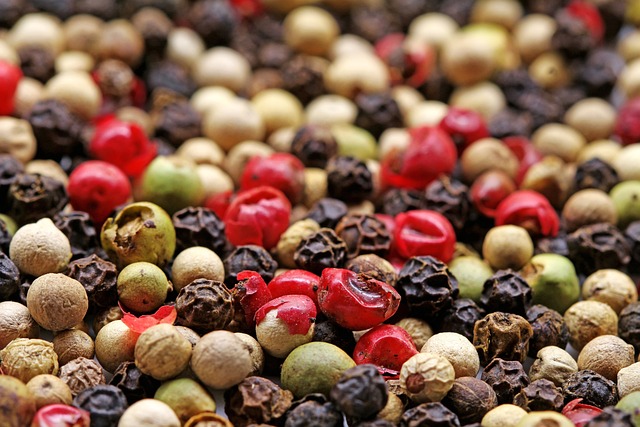Contents
Black Pepper: A Culinary Delight From Ancient Times to Modern Kitchens
Black pepper, also known as the “king of spices,” has been an integral part of culinary traditions throughout history. Its unique flavor and aroma have made it a staple in kitchens around the world. From ancient times to modern gastronomy, black pepper has enhanced the taste of countless dishes, earning its reputation as a culinary delight.
Black pepper originated from the Malabar Coast of India and quickly gained popularity among ancient civilizations for its exquisite taste and versatile usage. Traders and explorers introduced black pepper to various regions, including Europe, where it quickly became a symbol of wealth and prestige. It was even used as currency during the Middle Ages, reinforcing its importance in society.
Not only does black pepper add a distinctive spicy kick to food, but it also possesses several health benefits. It is rich in vitamins, minerals, and antioxidants, which can support digestion, boost the immune system, and aid in weight management. Additionally, black pepper has antimicrobial properties, making it a valuable spice in preserving food and fighting foodborne pathogens.
In modern kitchens, black pepper continues to be a crucial ingredient in a variety of savory and sweet dishes. It enhances the taste of soups, sauces, marinades, and rubs, giving them a flavorful depth. Its presence in desserts like chocolate and fruit-based treats adds a surprising twist, balancing sweetness with a hint of spice.
To fully experience the magic of black pepper, it’s recommended to use freshly ground peppercorns rather than pre-ground pepper. This ensures the preservation of its volatile oils, which contribute to its robust flavor and aroma. Whether in its whole form or ground, black pepper remains a timeless spice that adds zest and character to culinary creations.
The History of Black Pepper
Black pepper, scientifically known as Piper nigrum, is one of the most widely used spices in the world. It has a rich history that dates back thousands of years, making it a culinary delight from ancient times to modern kitchens. Let’s explore the journey of this versatile spice throughout the ages.
Ancient Origins
The origin of black pepper can be traced back to the lush forests of ancient India. It was highly valued for its pungent flavor and medicinal properties. References to black pepper have been found in Sanskrit texts dating back as early as 1000 BCE. It quickly became a prized commodity and was commonly used in trade between Asia and the Mediterranean region.
Spreading Across the Globe
During the height of the spice trade, black pepper found its way to different parts of the world. Arab traders played a vital role in spreading its popularity throughout Europe and Africa. The demand for black pepper was so high during this time that it became known as “black gold” due to its significant economic value.
Medieval Renaissance & Exploration
During the Medieval Renaissance period, black pepper continued to be highly sought after. It was one of the primary spices that motivated explorers like Christopher Columbus to embark on their voyages. The Europeans wanted to establish direct trade routes with the spice-rich lands of India and the East Indies, where black pepper was produced abundantly.
Modern Usage and Culinary Importance
Today, black pepper is an essential ingredient in kitchens worldwide. Its sharp and distinct flavor adds depth and complexity to various dishes. It is used in both savory and sweet preparations, making it a versatile spice that enhances the taste of everything from soups and stews to desserts and beverages.
Health Benefits and Uses
Besides its culinary uses, black pepper also offers numerous health benefits. It is known for its antioxidant and anti-inflammatory properties and can aid digestion, improve nutrient absorption, and relieve cold and cough symptoms. Additionally, it is commonly used in traditional medicine for its medicinal properties.
The Different Forms of Black Pepper
Black pepper is available in various forms to suit different culinary preferences. Apart from the classic whole peppercorns, you can find ground pepper, cracked pepper, and even pre-ground pepper in spice blends. Each form offers a unique texture and flavor profile, adding versatility to its usage in the kitchen.
Conclusion
From its humble origins in ancient India to becoming an integral part of global cuisines, black pepper has remained a cherished spice throughout history. Its journey across continents, its economic significance, and its culinary importance make it a timeless and irreplaceable ingredient in modern kitchens. So, next time you reach for that pepper grinder, remember the fascinating journey that led this culinary delight to your plate!
For more interesting facts and recipes related to black pepper, check out our Black Pepper: The King of Spices blog post.
Frequently Asked Questions
1. What is black pepper?
Black pepper is a commonly used spice that comes from the berries of the Piper nigrum plant. It is known for its strong, pungent flavor and spicy taste.
2. How is black pepper used in cooking?
Black pepper is used in a variety of culinary dishes to enhance the flavor. It can be used in both savory and sweet dishes, and is commonly found in marinades, rubs, sauces, and seasoning blends. It can be added during cooking or used as a garnish.
3. What are the health benefits of black pepper?
Black pepper is not only used for its taste but also has various health benefits. It contains a compound called piperine, which may have antioxidant and anti-inflammatory properties. It is also believed to aid in digestion, improve nutrient absorption, and promote respiratory health.
4. How long has black pepper been used in cooking?
Black pepper has a long history and has been used in cooking for thousands of years. It was highly valued in ancient times and was even used as a currency. Today, it continues to be a staple spice in many cuisines around the world.
5. Can black pepper be used as a substitute for other spices?
Yes, black pepper can often be used as a substitute for other spices in recipes. It can add a similar level of heat and flavor, although the taste may differ slightly. It is commonly used as a substitute for chili powder, cayenne pepper, and paprika.
6. How should black pepper be stored?
Black pepper should be stored in an airtight container in a cool, dark place. It should be kept away from heat, moisture, and sunlight to maintain its freshness and flavor. Ground pepper will lose its potency faster than whole peppercorns, so it is recommended to buy whole peppercorns and grind them as needed.
Black Pepper: The Versatile Spice
History of Black Pepper
Black pepper is a widely used spice that has been cultivated for centuries. It originated from the Malabar Coast of India and has since been traded and valued around the world. The spice played a prominent role in ancient trade routes and was highly sought after by merchants due to its pungent flavor and medicinal properties.
Health Benefits of Black Pepper
Black pepper is not only renowned for its flavor, but it also offers several health benefits. It contains a compound called piperine, which is known for its antioxidant, anti-inflammatory, and antimicrobial properties. Consuming black pepper can improve digestion, boost metabolism, and enhance nutrient absorption.
Culinary Uses of Black Pepper
Black pepper is a staple spice in kitchens worldwide and is used in various culinary preparations. Its strong and distinctive flavor adds depth to dishes, whether used in marinades, rubs, or sauces. It complements both savory and sweet recipes and is often included in spice blends such as garam masala and curry powder.
Interesting Facts about Black Pepper
Did you know that black pepper was once considered so valuable that it was used as currency? In ancient times, it was even used as a form of monetary exchange. Additionally, black pepper was a prized item during the Age of Exploration, leading to the discovery of new trade routes and contributing to the spice trade’s popularity.
If you want to learn more about black pepper, its history, and diverse uses, you can visit the Black Pepper page on Wikipedia.
Black Pepper: A Culinary Delight From Ancient Times to Modern Kitchens
Summary:
- Black pepper is a popular spice used in culinary dishes around the world.
- It has a long history and has been used as a seasoning for thousands of years.
- Black pepper was highly prized in ancient civilizations and considered a luxury item.
- Its importance led to spice trade routes and influenced exploration and colonization.
- In modern kitchens, black pepper is a versatile spice used in a wide variety of dishes.
- Its distinctive flavor adds depth and complexity to both savory and sweet recipes.
- Black pepper is known for its potential health benefits, including antioxidant properties.
- It is commonly used in combination with other spices to create unique flavor profiles.
- Black pepper is available in different forms such as whole peppercorns, ground pepper, and pepper extracts.
- It is important to store black pepper properly to maintain its flavor and aroma.








































